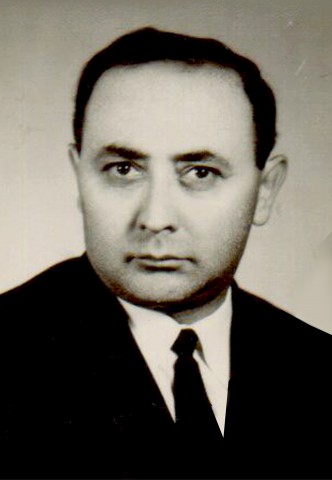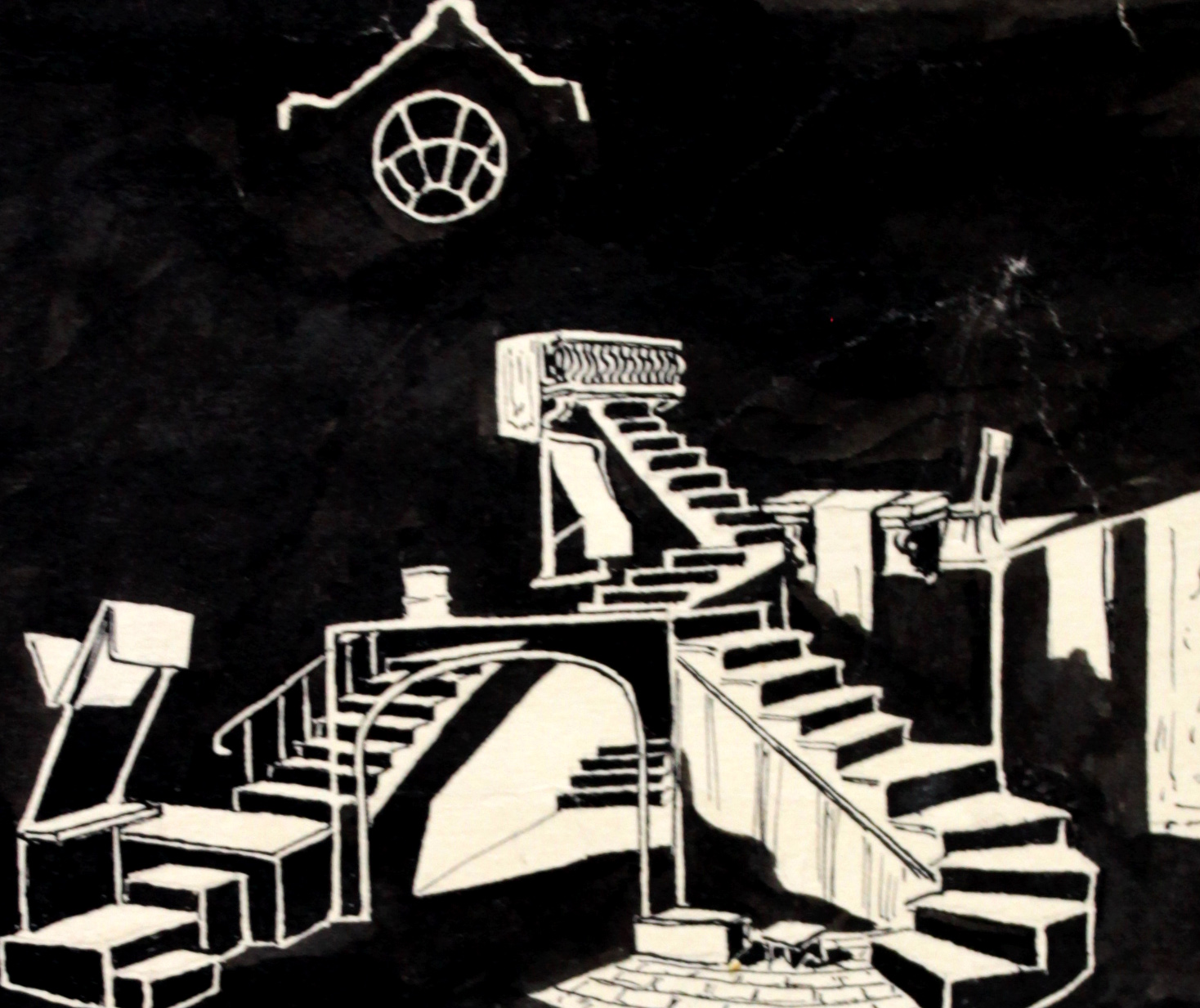select your style
choose your scheme
color scheme

select your style
choose your scheme
color scheme


GASIMOV Mammad Alakbar oglu was born on 05.01.1925 in Tbilisi and died on 28.01.1987 in Nakhchivan. Theater artist. Honored Art Worker of the Nakhchivan Autonomous Republic (1967). First chairman of the Nakhchivan Organization of the Union of Artists of Azerbaijan (1971). He studied at the Tbilisi Academy of Arts (1945-1947) and the Azerbaijan State Art School named after Azim Azimzade (1947-1952). He was a member of the USSR Artists' Union (1970). Until the end of his life he worked as the chief artist of Nakhchivan State Drama Theater (1952-1987). Mammad Gasimov on the stage of Nakhchivan Theater: Jalil Mammadguluzadeh's "Dead" (1943, 1944, 1950, 1951, 1961), Uzeyir Hajibeyov's "Husband and wife" (1943, 1955), "Arshin mal alan" (1943, 1945, 1955), " Mashadi Ibad ”(“ Let it be, let it be ”) (1963, 1985),“ Asli and Karam ”(1968); “My Mother’s Book” (1965, 1984); Reinhold Moiseyevich Glier's "Personally" (1944); “Heartbreakers” by Mammad Said Ordubadi (1945, 1956); Agasi Mashadibeyov's "Whose wedding is it" (1945); Suleiman Sani Akhundov's "Love and Revenge" (1947, 1955, 1957, 1958); “Farhad and Shirin” by Samad Vurgun (1947, 1956, 195, 1960), “Vagif” (1950, 1951, 1956, 1957, 1958, 1968), “Komsomol poem (1962)”; Carlo Goldoni's "A Servant of Two Masters" (1947), "Hotelkeeper" (1968, 1970); Shaid Rustamov's "Durna" (1948, 1957); Anvar Mammadkhanli's "In the Fire" (1948, 1954); Jafar Jabbarli's "Diamond" (1948), "Sevil" (1949, 1963), "Aydin" (1950, 1956, 1957), "In 1905" (1952), "Bride of Fire" (1953, 1954), " Pale Flowers ”(1954, 1956),“ Live ”(1958, 1967),“ Nasreddin Shah ”(1960, 1961); Mirza Ibrahimov's "Life" (1948, 1954), "The Good Man" (1966); Islam Safarli's "Good and Evil" (1948, 1950), "Eye Doctor" (1955, 1956, 1957), "Mother's Heart" (1960); “Spring Waters” by Ilyas Efendiyev (1948, 1949, 1950); Sabit Rahman's "Wedding" (1949, 1951, 1953, 1954, 1977), "Engaged Girl" (1954, 1955, 1956, 1960), "Star" (1958, 1959), "Aliqulu is getting married" (1960, 1961), "Happy" (1964); Zeynal Khalil's "Qatir Mammad" (1949, 1950, 1956, 1958); Alexander Arbuzov's "Six Favorite Friends" (1949); William Shakespeare's Twelfth Night (1949, 1951). The Winter's Tale (1960); Mirza Fatali Akhundov's "Haji Gara" (1949, 1954), "Lankaran khan's vizier" (1962); “Honor” by Alexander Shirvanzade (1950, 1955, 1960); Mir Jalil Pashayev's "Manifesto of a young man" (1950, 1952); Malyarovsky's The Magic Jug (1951); “Fairy Witch” by Abdurrahim bey Hagverdiyev (1953, 1954, 1955, 1957); Vadim Sobko's The Second Front (1953); Lope de Veqa “Star of Seville” (1954, 1955, 1956, 1960); Ilyas Efendiyev's "Atayev family" (1954, 1955), "Border guards" (1958), "You are always with me" (1965), "Destroyed diaries" (1973); Najaf bey Vazirov's "We came out of the rain, it rained" (1955), "Haji Gambar" (1955); Suleyman Rustam's "Fugitive Nabi" (1955, 1956, 1958, 1960); Abdulla Shaig's "Homeland" (1955, 1958, 1959); Eyyub Abbasov's "Malik Mammad" (1955, 1956, 1972), "Agil and Sarvinaz" (1956); Mammadhuseyn Tahmasib's "Flowering Mountain" (1956), "Spring" (1958); Vasily Shkvarkin's "Another Child" (1956); Georgi Midivani's "Honor of the Fatherland" (1956, 1958, 1959), "The Consul was Kidnapped" (1966); Asahmad Tokayev's "Adakhlilar" (1957); Huseyn Javid's "Sheikh Sanan" (1957, 1962), "Sayavush" (1962), "Sheyda" (1981), "Azer" (1983); Ogtay Khalilov's "In the Footsteps of Crime" (1957); Majid Shamkhalov's "Mother-in-law" (1957, 1958); Rabindranath Tagore's "Daughter of Gang" (1958); “Nadir Shah” by Nariman Narimanov (1958, 1964); Mehdi Hussein's "Javanshir" (1958); Bichari's "Treason" (1958); Aliyar Yusifli's "Torment of Conscience" (1958, 1959, 1964), "Live happily!" (1981); Bakhtiyar Vahabzadeh's "Justice" (1958, 1959), "After the Rain" (1972); Bagdasarov's "Bloody Morning" (1959); “Coastal Operation” by Jamshid Amirov (1959, 1960); Sattar Akhundov's "Funny" (1960); Suleyman Aliyev's "One son of two mothers" (1960) "Living statue" (1978); G. Mammadov's "When the place of Dan was demolished" (1960); Firudin Akhundov's "Bloody Plane" (1961); Wang Shin-Fu's "Broken Glass" (1961); Maharram Alizadeh's "Whose Wedding Is It" (1961, 1962); Mammadali Tarverdiyev's "Shadow Mountain" (1962); Karagin Besin “Brick Man” (1962, 1963); Huseyn Razi's "Fiery Land" (1963, 1964, 1965), "Sun" (1968), "Back Mountains" (1971); Suleyman Alasgarov's "We know ourselves" (1963), "Where are you, single?" (1963); Abil Yusifov's "Flowering Dreams" (1964); Adil Babayev's "Heart Calls" (1964); Kamala Agayeva's "Mahsati" (1964, 1976), "Ismet" (1972), "My god is beauty, love" (1982). “Floods Carried Sara” (1985); Alexander Ostrovsky's The Unarmed Girl (1964, 1966) and Innocent Guilty (1984); Gilberto Figueredo's Aesop (1965, 1966); Aliheydar Gambarov's "Storm in the Snake's Nest" (1966); Suleyman Rashidi's "I am looking for him" (1967); Huseyn Ibrahimov's "Lost Health" (1967); Shikhali Gurbanov's "Without You" (1967); Boris Lavrenyov's "Attack" (1967); Abil Yusifov's "Monument of Love" (1969); Friedrich Schiller's "Cunning and Love" (1969); Georgi Khudayev "My wife's husband" (1971); Andrey Makayonok “Tribunal” (1972); Konstantin Simonov “Fourthü ”(“ They were four ”) (1975); Pancho Panchev's The Tale of the Four Twins (1975); Nodar Dumbadze "Darınma ana!" (1976); Vsevolod Ivanov “Armored train 14-69" (1977, 1980); Ramig Nagiyev "If you love ..." (1977); Rustam Ibrahimbayov “The door behind the green door” (1978); Gralkhan Bokayev “Daycha” (“Adults”) (1978, 1979); Salam Gadirzadeh "Shirinbala collects honey" (1979); Nazim Hikmet "The first day of the holiday" (1980); Shota Rokova's Green Hat (1982); Nidayat Orujov “Don't blame me” (1983); Akram Aylisli's "Precious Rhymes" (1985) and others. He staged 123 classic and modern works, drew sketches of clothes, made various decorations and panels. For more than 40 years he worked as the chief artist of the theater. His works are preserved in the personal collection of the artist's son, well-known theater scholar, Doctor of Philosophy in Art History, Associate Professor Alakbar Gasimov.

